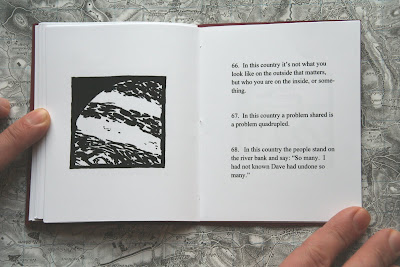 Hamlet sees his father’s goat on the battlements of Elsinore.
Hamlet sees his father’s goat on the battlements of Elsinore.Christmas fast approaches. The ground is frozen hard, half-moons of ice lie in hoof-marks in the lane and the hedges are stark with frost beneath a sky like aged cutlery. And here at Hawker’s Pot it is a tradition that on Christmas Eve we pull up our chairs to the fire and tell each other spine-chilling goat stories. How well I remember the tale Algernon told a few years back, a true story of a night spent bivouacked in a haunted wood. All night, at the edge of the flickering circle of firelight, the unearthly form of a goat stood between the trees. They found out next morning (from a passing stranger) that a farmer had hanged himself in that very wood and this was his goat that now had nowhere to go. Equally I remember the Reverend Hawker’s tale of the time he was benighted in the furthest reaches of his desolate parish, and accepted the invitation to spend the night in a poor labourer’s ruinous cottage. All night he was kept awake by the clanking of a chain beneath his window and the most baleful of moans. In the morning, the hale, red-cheeked inhabitants had laughed: “Oh, we didn’t tell you about the goat, did we?” And then there was the Christmas that we had the pleasure of the company of that expert in the supernatural, Geoffrey Carstairs, and he recounted a terrifying incident when he had awoken in the night and found a goat standing by his bedside. “I’ve no idea how it got in, but I shall never forget the expression on its face as it observed me with those evil rectangular eyes, and how it moved its jaw from side to side, as if thinking a thought too terrible for humanity, a thought as cold and deep and horrible as space! I lay there, rigid, unmoving, with ice in my veins. Finally it spoke ... it spoke its dread message that had brought it here ... ‘me-eh,’ it began, and, ‘me-eh,’ again. Urgent, insistent, loud, that voice rang out, but never could it get beyond this first awful syllable. Finally, it turned tail and cantered out. But I tell you, the greatest horror was reserved till last: for ... oh! ... fiend of fiends! ...at the end of its legs were ... goats’ hooves!”

But this year I have been deep in books and have found a story to make their blood run cold: a story by one of our greatest English writers, the tale of an innocent old man menaced horribly by goats in his own home. Yes, this year, I shall chill their spines by reading them Charles Dickens’ A Christmas Carol, and they shall hear of The Goat of Christmas Past, The Goat of Christmas Present and The Goat of Christmas Yet to Come. Brrr! Terrifying. If anyone thinks they can tell a more scare-inducing story this Christmas, I tell them they don’t stand a goat of a chance!
A Merry Christmas to ye all.





















































